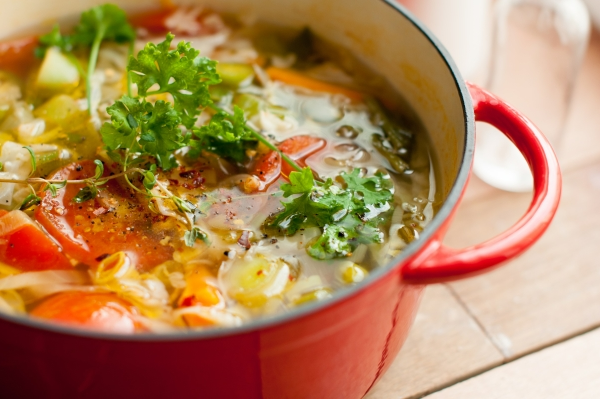What Is a Dutch Oven, and Do I Need One?

There’s no shortage of information about the advantages of owning an instant pot or an air fryer, but not much about why you should own a Dutch oven. Even if you’ve heard it mentioned in conversation—someone you know talks about a recipe their mom made using a Dutch oven—you still might not know how it works or why you need one. However, if you learn about the different types of Dutch ovens, you may discover how owning one can help expand your meal options in the kitchen.
What is a Dutch Oven?
Basically, a Dutch oven is just a sturdy, thick-walled pot covered with a tight lid. They come in a variety of sizes and materials, and are often used for slow-cooking meat, soups, and bread. Dutch ovens look like stockpots but have wider bases and slightly shorter but thicker walls. They also have two short handles on either side, instead of one long one, to make them easier to take in and out of the oven. A Dutch oven’s thicker walls allow for better browning and caramelization of ingredients and heat retention. It can also double as a serving piece to keep food warm on the table.
Different Types of Dutch Oven
As you might have guessed, Dutch ovens were initially produced by the people of the Netherlands, who first cast cooking vessels in the 17th century, creating a range of pots, pans, and casserole dishes. Their method of casting post was so successful, English smiths began copying their technique. Later, English travelers brought their “Dutch ovens” to the New World. Dutch ovens have many varieties, including:
-
Cast Iron Bare—Bare Dutch ovens resilient and are known for maintaining a consistent temperature for long periods of time. This makes them ideal for cooking something slowly on a low heat. Cast-iron cookware requires proper maintenance, so this type of Dutch oven will need to be handwashed and can’t be thrown in your dishwasher. It also needs to be seasoned to cook at peak performance, so keeping it in good shape can be time consuming. However, if a cast iron Dutch oven is properly cared for, it will last a lifetime—possibly several lifetimes.
-
Enameled—Enameled Dutch ovens have gained popularity over the years, especially with the Le Creuset brand, which has become a leader in the Dutch oven cookware industry. Enameled Dutch ovens have all the benefits of traditional ones but are much easier to maintain. They’re known for their durability, versatility, functionality, and design. The main downside with an enameled cast iron is the cost—they can carry a hefty price tag.
-
Ceramic—Ceramic Dutch ovens are more lightweight than other types, making them more user friendly. They have all the benefits of the bare and enameled Dutch overs, except for their durability. Ceramic Dutch ovens are more likely to crack if dropped or if exposed to extreme temperature changes.
Sizes
As Dutch ovens became more popular, different sizes were created for different tasks.
-
Small—The smallest 1-quart size serves one or two people. This is perfect for a couple making a meal together.
-
Medium—The 5 ½-quart size, which makes five or six servings, is the average size for a family meal or provides leftovers after a dinner for two.
-
Large—The largest 13 ¼-quart size serves nine or more. This size is perfect for a party or family get-together around the holidays.
Uses
Dutch ovens are very versatile and can be used for many kinds of cooking.
-
Braising Meat—It’s easier to braise meat within the heavy material of a Dutch oven. It maintains a high temperature while cooking and allows you to braise meats to your desired tenderness.
-
Soups or Stews—Between the capacity and slow cooking time, a Dutch oven is perfect for cooking things low and slow, like soups or stews. This makes it a perfect staple for cold winter days.
-
Making Bread—Dutch ovens are great for making bread because of their thick walls and heavy lid. These two features create a steamy environment that helps to keep the dough nice and moist, while also helping it rise.
Your First Dutch Oven Bread Recipe
Are you ready to get cooking? Try this easy recipe for your first Dutch oven experience. Don’t worry, practice makes perfect and soon you will be a professional bread baker or soup maker! However, if your Dutch oven doesn’t seem to be heating evenly, the problem may be your stove. If you suspect the heating element in your stove might be faulty, call the pros at Mr. Appliance. We repair all types of electric ovens, stoves, and ranges—and when it comes to quality services, we really bring the heat! Call us or schedule an appointment online.
 Click to call
Click to call


